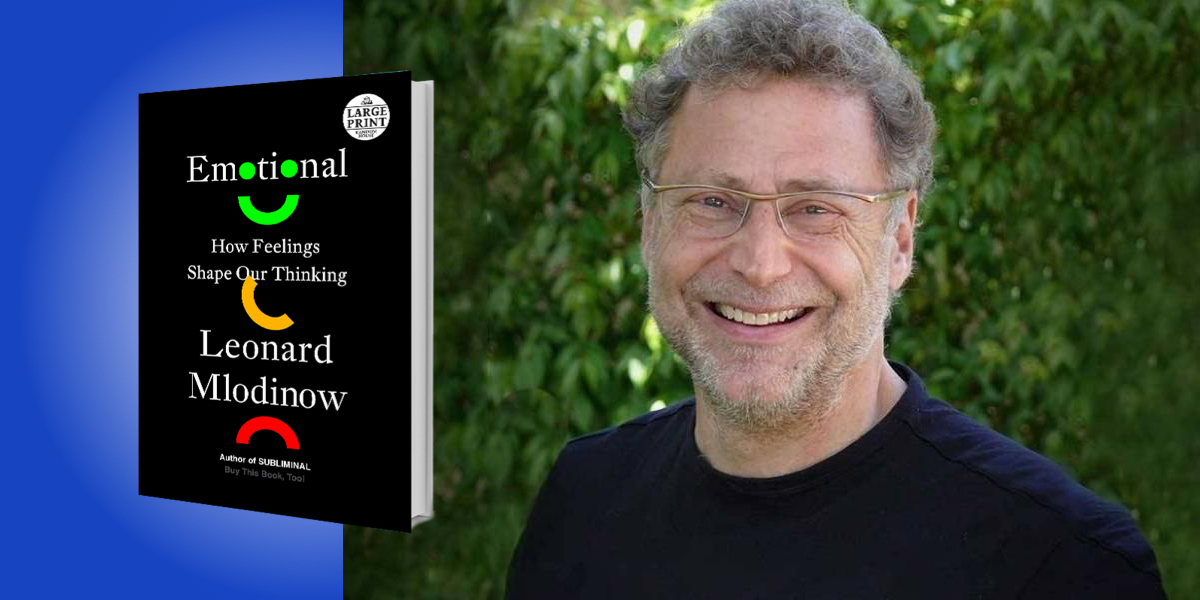Leonard Mlodinow received his PhD in theoretical physics from the University of California, Berkeley, was an Alexander von Humboldt fellow at the Max Planck Institute, and was on the faculty of the California Institute of Technology. His previous books include the bestsellers The Grand Design and A Briefer History of Time (both with Stephen Hawking), Subliminal (winner of the PEN/E. O. Wilson Literary Science Writing Award), The Drunkard’s Walk, and Elastic.
Below, Leonard shares 5 key insights from his new book, Emotional: How Feelings Shape Our Thinking. Listen to the audio version—read by Leonard himself—in the Next Big Idea App.
1. Darwin was wrong about emotion.
Before the current burst of research into emotion, most scientists understood our feelings within a framework that goes all the way back to Charles Darwin. That traditional theory of emotion embraced a number of principles that seemed intuitively plausible—for example, that there’s a set of basic emotions: fear, anger, sadness, disgust, happiness, and surprise, which are universal among all cultures and have no overlap. Also, that each emotion is triggered by a specific stimulus in the external world, and that each emotion causes fixed and specific behaviors.
This idea really goes back to the ancient Greeks, but it turns out it’s all wrong. Just as Newton’s laws of motion were superseded by quantum theory when science developed new tools that allowed us to see into the atomic world, so too is the old theory of emotion now giving way to a new view, thanks in large part to extraordinary advances in neuroimaging and technology. Scientists have found that while the old viewpoint offered what seemed like plausible answers to basic questions about feeling, it didn’t accurately represent the way the human brain really operates.
For example, each of those six basic emotions isn’t really a single emotion. It’s actually a catch-all term for a spectrum or category of feelings, and those categories aren’t necessarily distinct from one another. Fear, for example, has a lot of overlap with anxiety, and fear isn’t even a single emotion—it comes in different flavors. In the brain, a fear of a spider, for example, has a different mechanism than fear of suffocation.
“Fear, for example, has a lot of overlap with anxiety, and fear isn’t even a single emotion—it comes in different flavors.”
What’s more, the amygdala—long thought of as our fear center—actually plays a key role in several emotions, and it’s not necessary for all types of fear. Scientists today have also expanded their focus far beyond those five or six basic emotions to include dozens of others, such as social emotions like embarrassment and pride, and even feelings that used to be thought of as drives, such as hunger and sexual desire.
2. Emotions aid decision-making.
Darwin believed that emotions play a key role in non-human animals, but that we humans have outgrown it. He believed that we had rational thought and that it’s far superior to emotion. Today we know better. Emotion is as important as reason in guiding our thoughts and decisions, though it operates in a different manner. While rational thought allows us to draw logical conclusions based on our goals and relevant data, emotion operates at a more abstract level. It affects the importance we assign to the goals and the weight that we give to the data. It forms a framework for our assessment that isn’t just constructive, but also necessary. Rooted in both our knowledge and our past experience, emotion changes the way we think about our present circumstances and our future prospects—often in subtle and consequential ways.
Consider a case study led by Mark Fenton-O’Creevy, a professor at the Open University Business School, Northeast of Oxford. He studied over 100 professional traders at investment banks to learn their keys to success. Trading is a fast-paced and demanding profession requiring complex and important decisions to be made very quickly. There’s a lot at stake—and that’s where emotions enter the picture. At the unconscious level, emotions, which draw on past experience, provide a radar that directs your attention and shapes your perception of both threats and opportunities. Through emotion, the steady stream of data and outcomes will, over time, shape your intuition and allow you to rapidly choose the appropriate action.
“Emotion is as important as reason in guiding our thoughts and decisions, though it operates in a different manner.”
Fenton-O’Creevy found that the relatively less successful traders generally deny that emotion played any significant role in their job. They tried to suppress their emotions, while, at the same time, denying that emotions had an effect on their decision-making. But he found that the most successful traders had a markedly different attitude. They acknowledged their emotion. They showed a greater willingness to reflect on their emotion-driven behavior. They recognized that emotion and good decision-making are inextricably linked. Accepting that emotions were necessary for high performance, they tended to reflect critically about the origin of their intuitions and the role of their emotion. They embraced the positive and essential role emotions played, while understanding that when emotions become too intense, it’s useful to know how to tone them down.
The issue for successful traders wasn’t how to avoid emotion, but how to regulate and harness it. Emotions aren’t infallible—just as our visual system suffers from optical illusions, emotions can, in some cases, go out of control. But in the vast majority of cases, what Fenton-O’Creevy found is true of security traders is also true of all of us: In general, emotion plays a vital role in sound decision-making.
3. Emotion and rational thought are inseparable.
Paul Dirac was one of the greatest physicists of the 20th century, a pioneer in quantum theory. The electronics, computers, communication, and internet technologies that dominate modern life are all based on his theories. Over the decades, the most famous physicists of their generations approached this master and asked him the secret to success in physics. What did he tell them?
“Be guided,” he said, “above all, by your emotions.”
Why would he say this? People think of physics as consisting of formulas, like A + B = C. But as you’re doing research, you usually run into situations in which A + B could be C or D or E, depending on which assumptions you choose and what approximations you make. Even the act of exploring A + B is itself a matter of choice—maybe you should instead look at A + C, or A + D.
“Each emotion represents a different mode of thinking, and creates corresponding adjustments to your judgment and reasoning.”
In physics, emotion guides your decisions about what you’re doing—about the path of mathematics to explore, for example, or how you do it, or what assumptions you make. It’s based on both unconscious and conscious processes that encode your goals and your past experiences in ways you might not realize.
Just as explorers of old used a combination of knowledge and intuition to find their way across the wilderness, physicists make their decisions based on the mathematics of their theory, but also based on their feelings. Just as the great explorers often pushed on with little to justify their decision, so too must physicists sometimes proceed with their grueling mathematical calculations, fueled by little more than irrational exuberance.
If even the most precise and analytical thinking must be blended with emotion to be successful, it’s no surprise that emotion has a great influence over our daily thoughts and decisions. In life, rarely is it clear which path or action to take. Our decisions are based on complex sets of circumstances and facts, probabilities and risks, and incomplete information. Our brains then process that data and calculate our mental and physical response. We use our rational minds to reason, but our rational calculations don’t occur in a vacuum; they’re inextricably guided by our emotional state, and emotion is a mode of mental operation, a functional backdrop that orchestrates and coordinates the brain’s many programs, in a manner in tune to the type of situation you’re in. Each emotion represents a different mode of thinking, and creates corresponding adjustments to your judgment and reasoning.
4. Without feelings, we wouldn’t even get out of bed.
Consider the robot Sophia, developed in 2015 by a company called Hanson Robotics. Sophia looks human, sounds human, and is capable of impressive facial expression. But Sophia isn’t really human-like at all. Despite her impressive appearance, just like any other computer, she’s incapable of independent thought and action. If you took her to a room or a garden or the middle of a busy street and you turned her on, what would she do? Would she explore the room? No, that would take curiosity. Would she gaze at the beauty of the garden? No, she has no sense of enjoyment. Would she carefully walk off the street and onto the safety of the sidewalk? No, she has no drive to avoid harm.
“To decide whether to take action, and to motivate us to keep trying if the quest is difficult or unpleasant, is one of the great gifts of our emotions.”
A robot like Sophia can be charming, but she doesn’t decide to act in the sense that a human does. She merely executes a fixed set of instructions beginning when she is activated and ending when her program reaches the instruction to stop. To execute a pre-scripted set of behaviors in reaction to a predefined trigger is a skill that developed early in our evolutionary history, and it remains in the playbook of all animals, including us humans. But higher animals, unlike more primitive life forms and unlike Sophia, also possess the ability to decide whether to act based on their assessment of a novel situation, one that presents no preordained trigger.
This ability is actuated through processes of ever-increasing levels of complexity. At the most primitive echelon, there is a capacity for feeling that is binary. It’s called “core affect,” and it divides all our experience into either good or bad. Then there are the basic feelings of fear, anxiety, sadness, hunger, pain, and so on. And in humans, our brain circuits also produce nuanced and sophisticated social emotions, such as pride, embarrassment, guilt, and jealousy. Ultimately, the interaction of all these levels of emotion produces our urge to act or to refrain from acting. To decide whether to take action, and to motivate us to keep trying if the quest is difficult or unpleasant, is one of the great gifts of our emotions.
5. You can manage your emotion.
Our emotions take us to the depth of sorrow and the heights of joy. They’re the dominant driver behind our choices and behaviors. They’re the reason we formulate and achieve our goals, but they can also be the number one thing that derails us. It’s okay to feel a heart-wrenching sadness when reminded of the loss of a loved one, but it’s not okay to feel that because you can’t open a jar of marinara. One of the recurring themes in the study of emotion is that emotions are a necessary part of our existence, and they’re usually beneficial. But because they evolved in an era when our lives were much different, there are bound to be times when they may not be optimal for our needs today.
“Emotion regulation has both physical and psychological benefits. For example, it’s correlated to better physical health, especially with regard to cardiac disease.”
In particular, overly intense emotional states can have a downside. There will be times when it’s best to hide or suppress our feelings because they will be seen by others as unprofessional or inappropriate, when for the sake of our own well-being, we might want to lower the intensity of what we’re feeling. Emotion regulation has both physical and psychological benefits. For example, it’s correlated to better physical health, especially with regard to cardiac disease. In one study of older men, those who had the lowest level of emotion regulation had a 60 percent greater chance of suffering a heart attack than those who were skilled at regulation. In the last decade or two, research psychologists have focused on sorting all this out by studying and validating the efficacy of the various approaches in emotion regulation. Three of the most effective are acceptance, reappraisal, and expression.
Epictetus wrote, “A man’s master is he who is able to confirm or remove whatever the man seeks or shuns.” If you depend on no one except yourself to satisfy your desires, you’ll have no master other than yourself, and you’ll be free. Stoic philosophy was about that—about taking charge of your life, learning to work on those things that are within your power to accomplish or change, and not to waste energy on things that you can’t change. We don’t get angry at the rain if it spoils our picnic—that would be silly, because we can’t do anything about the rain. But we often do get angry if someone mistreats us, even though we often can’t control that person any more than we can banish the rain. So that’s equally silly. Acceptance is about recognizing that, and implementing it in our lives. Acceptance is the heart of the Stoic approach; you can lessen emotional pain if you accept that the worst may happen, and focus only on what you can do to respond in a positive way. That allows emotions to motivate you, rather than sabotaging you.
The next technique is called reappraisal. Imagine you’re driving to a business meeting, and you run into a street blocked by construction. You get lost trying to follow a detour, and end up 20 minutes late. You might respond by thinking, “Why can’t those idiots provide clear directions?” Such thoughts could make you angry, or you might blame yourself, thinking, “Why am I always getting lost? What’s wrong with me?” That response might make you frustrated. Each of these negative appraisals of the roadblock and its consequences probably has a bit of truth to it. And chances are that one of them, or some other interpretation, will be dominant, and determine the emotion you feel. That’s how emotions work.
“If there are different ways you can appraise things, why not train yourself to think in a way that leads to the emotion you want?”
Making sense of what just happened is one of the phases your brain goes through as an emotional reaction develops. Psychologists call that “appraisal.” But if there are different ways of looking at something that lead to different emotions, if there are different ways you can appraise things, why not train yourself to think in a way that leads to the emotion you want? In this case, for example, you might guide yourself to think such thoughts as, “People won’t care if I’m late because there are others at the meeting,” or, “This won’t bother anyone because I’m usually on time,” or, “It’s a good thing the construction made me late. It gives me a great excuse to miss the first 20 minutes of a boring meeting.” Altering the course of how your brain appraises and makes sense of things is a way to short-circuit the cycle that leads to unwanted emotion.
There are emotional reactions that empower you, and there are those that disempower you. Empowering emotions help you discover the lessons of every situation and move you toward your goals, while disempowering interpretations tie you to negativity and get in the way. Reappraisal involves recognizing a negative pattern developing in your thoughts and changing it to one that’s more desirable—but in a manner that’s still based in reality.
The third technique for managing emotions is called expression, and it’s about the power of words. Karen S., for example, was the CEO of a midsize Hollywood production company. It’s a demanding and competitive business, and to be successful, she often had to keep a good working relationship with clients, even after they broke commitments or treated her unfairly. At times she would grow angry, and that used to get in the way of her work. Then she discovered a remedy—she decided she’d write an email to the offender, describing in detail the perceived injustice and openly stating her honest and uncensored feelings about it. But she never sent the emails. She would save them to her drafts folder, promising herself to look at it again in a couple days, which she never did.
Does talking or writing about an emotion help you get over it? Surveys taken by research psychologists show that most people think it doesn’t work—but it does. Contrary to public opinion, expressing unwanted negative emotion does help defuse it. Clinical psychologists have found that talking is most effective when the sharing is done with trusted friends or significant others, especially if those people have experienced similar issues. Finding the right time to talk is also crucial. Exposing your feelings is important, but it can be scary, and things can go wrong if the person on the listening end is distracted or doesn’t have time to hear you out. But however you do it, expressing your feelings is an important way of defusing them.
To listen to the audio version read by author Leonard Mlodinow, download the Next Big Idea App today:































